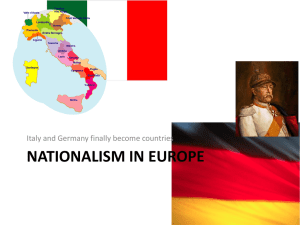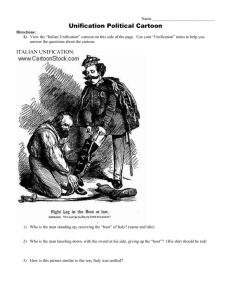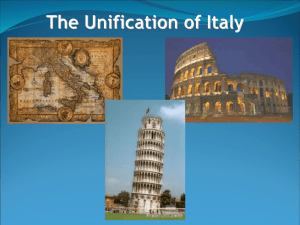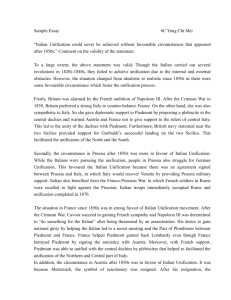Italian Unification DBQ
advertisement
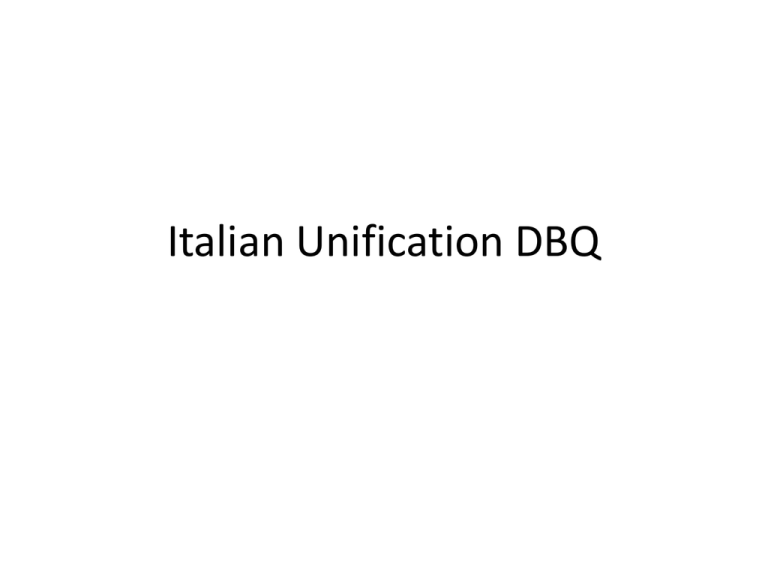
Italian Unification DBQ Solid Theses • The efforts of Mazzini, Cavour, and others to unify Italy raised debate on how to best do so. Resolutions proposed included unification under a monarchy, unification under a republic, and no unification at all. • During Italian unification, debates over whether Italy should be a monarchy or a republic were prominent, and some advocated for the continued separation of Italian states. How can you fix this thesis? • Italian unification was possible through multiple ways, including a republic, monarchy, or religious leader, but most important was foreign entities must be removed. Doc. 1 – do these POVs count? 1. Mazzini was a radical patriot, who believed all people should be able to have a say in the government, so that most likely affected his public opinion. 2. Being exiled from Piedmont, Mazzini would be looking towards unification because of the corruption present in the Italian states not under a unified government. Doc. 2 – do these POVs count? 1. It is important to take into consideration that Cattaneo lived in Lombardy which was under Austrian rule after the Congress of Vienna. His beliefs must have been influenced by Austrian rule and he may have been unaware of the growing nationalist sentiment in central Italy at the time. 2. Cattaneo is both a philosopher and a political activist, so he is not solely concerned about the politics. His role as a philosopher may give him a better understanding of human nature, so he is able to see a reason beside a political one, of why Italy cannot unify as it will be challenging for the people. 3. His tone displays his views of Italian nationalists as foolish, calling unified Italy a dream of many people but still a dream. He believes that the centuries of Italian separation cannot be helped and that people will be loyal to their states rather than to a unified Italy. He displays his views on the futility of unification efforts by describing them as people building their ideas on sand, which means without a strong base and foundation. Doc. 3 – do these POVs count? 1. Because Gioberti is a priest and thus a follower of the pope, it follows that he would favor the pope as the civil head of Italy. 2. Gioberti himself being a priest, would likely advocate for such a method, as his allegiance lies directly with the pope. He would likely think that the pope would be a suitable leader as he holds him in reverence and is loyal to him. Doc. 4 – does this POV count? • Since he was an upper class man, it is assumed that he would side with monarch, as other middle class and upper class people did. Doc. 5 – does this POV count? • In 1848, Pope Pius was forced out of Rome by a revolution. The revolution scare made Pius more conservative. Since he became more conservative, he would oppose any new form of government or change, which is exactly what he is doing in his statement towards Italy. Doc. 6 – do these POVs count? 1. Manin was most likely expressing his true opinion, as he was writing a letter to a friend, and did not have a crowd to persuade or please. 2. Daniele Manin mentioned this while sending a letter to a friend which concludes that what he was saying was truly his opinion and that others shared this view as well if a politician was thinking it. Doc. 12 – do these POVs count? 1. Garibaldi is most likely a highly legitimate source because he was popular among his supporters and achieved this popularity with his beliefs, meaning that his beliefs coincide with the beliefs of the masses. 2. Garibaldi was the son of a sailor and came from humble beginnings, and undoubtedly, he would support a government that helped the poor.
